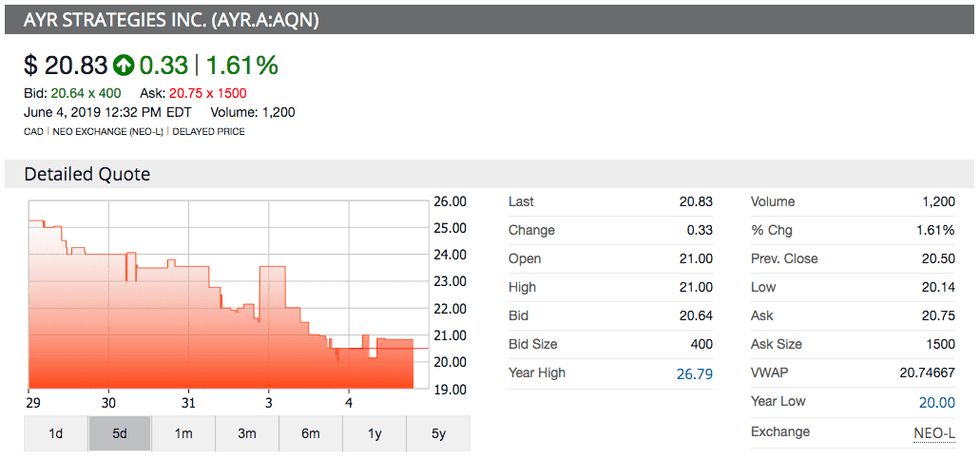Jennifer Drake, chief operating officer with AYR Strategies, explains the upcoming acquisition strategy for the MSO.
A new vertically integrated multi-state operator (MSO) has reached the public market in Canada thanks to a mature listing method.
On May 27, the emerging NEO Exchange confirmed the listing of AYR Strategies (NEO:AYR.A), previously a special purpose acquisition company (SPAC) known as Cannabis Strategies Acquisition (CSA). AYR is the first recreational cannabis company with a valuation of over C$1 billion to list on the exchange.
Marijuana investors have seen a rush for public capital lead to maturity and recognition from established players and institutions. Now the investment space is seeing the emergence of a listing method that could offer more transparency to investors.
SPACs are public firms that seek acquisitions using money from investors who participate in an initial capital raise. Among other restrictions, SPACs must complete acquisitions within a certain time period, and their acquisitions may have to meet specific criteria laid out when money was first raised.
In its announcement, the NEO Exchange indicates that when AYR launched its first initial public offering under the name CSA in 2017 it was the first marijuana SPAC to list on the Toronto-based exchange.
“We are very happy today to see the full circle completed by CSA,” Jos Schmitt, president and CEO of the NEO Exchange, said in a press release. “As a stock exchange for senior listed companies, we are excited and motivated to be capital-raising partners on the front lines of an exciting industry.”
As noted, the public launch of AYR came with a C$1 billion valuation, a first for a recreational marijuana firm listed on the NEO Exchange. Currently, the company holds a C$850 million market capitalization.
The NEO Exchange has been increasing its offerings to investors in the marijuana market. This year it saw its first billion dollar marijuana listing and the launch of two US-focused exchange-traded funds.
After completing a qualifying transaction and establishing the new face of the company, Jennifer Drake, chief operating officer with AYR, told the Investing News Network (INN) about the approach the company will take now that it can operate beyond its initial limitations under the SPAC model.
“Because we used the SPAC mechanism to raise the initial capital, the rules are we can only go forward if our companies can produce three years of audited financials,” Drake told INN.
While the race for adding marijuana assets across the US market has led to an explosion of capital in Canada, Drake said that AYR is looking to operate with a disciplined acquisition strategy moving forward as an active MSO.
Drake, who is a former managing director with Goldman Sachs (NYSE:GS), said that while the company is excited to operate and pursue deals outside SPAC restrictions, AYR doesn’t see the point in being present in every possible avenue.
“We don’t necessarily think you have to catch up and have 30 states,” said Drake. “We think it’s important to be in the states that matter and to cluster your operations and penetrate those markets deeply.”
The strategy that Drake laid out was one of measured external growth targeted at limited licensing states with recreational programs, or states on the verge of creating adult-use marijuana programs.
The executive explained that the company wants to retain one aspect of its SPAC operation days: valuing established operating assets with a proven track record.
In speaking with INN, Drake said that CSA recorded positive earnings before interest, tax, depreciation and amortization (EBITDA) of C$30 million in 2018.
“Our model is to buy best in class operators that have existing track records that have positive EBITDA,” Drake said.
As part of its financial results for the year, issued in November 2018, CSA reported a net loss of C$47.2 million, resulting in a basic and diluted net loss per share of C$15.07.
As of 12:32 p.m. EDT on Tuesday (June 4), AYR was up 1.61 percent for a price of C$20.83 per share. The company recorded its highest share price in May, when its stock was worth C$26.79.
As CSA, the company purchased five independent marijuana operations in the US split between Nevada and Massachusetts: Washie Wellness, The Canopy NV, Sira Naturals, LivFree Wellness and CannaPunch of Nevada.
Thanks to these acquisitions, AYR launched as an MSO in these two state markets and will now seek to expand its portfolio.
“We need to make sure that when we’re making acquisitions we do them creatively and at the right price,” Drake said.
Investor takeaway
When asked if the SPAC launch model will create a more stable stock performance — in a sector in which stability is rare — Drake said she wants AYR’s business model of targeting positive EBITDA operations to create that stability.
During a panel at the Arcview Investor Forum in Vancouver, Jonathan Sandelman, CEO of AYR, said SPACs will appeal to marijuana investors because of the strict transparency in their acquisition model.
“Its mission is to be very much like a private equity firm, but with daily liquidity, with the optionality not given to a private equity manager but to the investor,” he said during the panel.
Anna Serin, director of listings development with the Canadian Securities Exchange (CSE), also said during the panel that SPACs will make an appearance on the CSE soon.
“With a SPAC, you’re investing in a management team who’s going to go out and acquire assets … in the future,” Serin said.
Don’t forget to follow us @INN_Cannabis for real-time news updates!
Securities Disclosure: I, Bryan Mc Govern, hold no direct investment interest in any company mentioned in this article.
Editorial Disclosure: The Investing News Network does not guarantee the accuracy or thoroughness of the information reported in contributed article. The opinions expressed in these interviews do not reflect the opinions of the Investing News Network and do not constitute investment advice. All readers are encouraged to perform their own due diligence.
